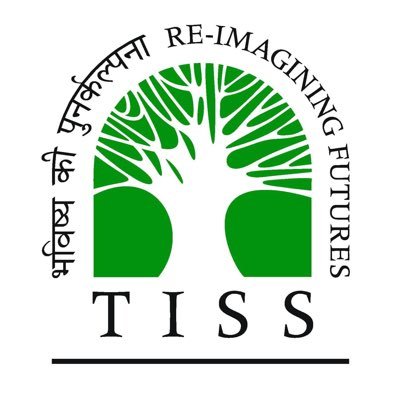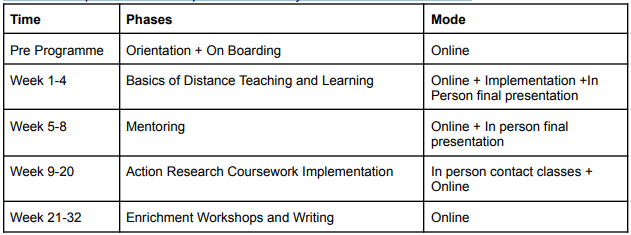South Asian Teacher Educators (SATE) Fellowship

![]()
Last date of submission: 25th April 2022
The Centre of Excellence in Teacher Education(CETE), Tata Institute of Social Sciences, India along with Villa College, Maldives and Swedish Committee for Afghanistan is seeking applications for a 8 month long fellowship for Teacher Educators in Nepal. The consortium is looking to fill 15 positions for this fellowship. The fellowship is part of the MATPD project funded by GPE and IDRC under the Knowledge and Innovation Exchange initiative.
Context of the Project
There is an urgent need to address the gaps in the professional development of teacher educators and teachers in Afghanistan, Maldives, and Nepal, particularly in response to the requirements of the evolving educational reforms in these countries. The use of distance learning technologies, action research, and professional communities of practice remain largely untapped opportunities for TPD in these countries. Additionally, the crisis in the education sector due to the Covid-19 pandemic, which led to school closure for periods of time has further exacerbated the inequities in the South Asian countries, highlighting the need to enhance the capacity of teachers and thus teacher educators’ preparedness.
A Multimodal Approach to Teacher Professional Development in Low Resource Settings (MATPD) attempts to inquire into some of these challenges and teacher educators’ experiences of working with teachers.
About the Fellowship
The SATE Fellowship aims to develop the capacities of educators for leading distance teaching and learning experiences by mentoring a community of teachers. The educators as ‘fellows’ will undergo training in Basics of Distance Teaching and Learning, Mentoring and Action Research and be expected to participate in workshops on Wellbeing of TE and Teachers , Social Inclusion and Gender and Designing Case Studies. An important focus of the programme is to develop understanding of and engage the fellows in these concepts to enable them to design an action research by working with teachers . The programme is designed to equip fellows to include reflection, adaptable Distance Teaching and Learning tools and collaboration in their practice. Fellows from Afghanistan, Maldives and Nepal will immerse themselves in online coursework, webinars, 10 day face to face training and a field study period (2 to 3 months) with a cohort of teachers.
Fellowship Objectives
- Developing holistic and reflective perspectives on the usage of distance teaching-learning methodologies for supporting their professional growth as well as supporting teachers
- Empower fellows to use Action Research to develop contextualized solutions for teaching learning
- Developing skills of mentoring among fellows to support teachers collaboratively
Eligibility
- Fellows must be practicing teacher educators/professionals who have access to and can work with school teachers.
- At Least 5 years of work experience in the education sector. If currently employed in an institution, the management must have provided a no-objection certificate to the Fellows participating in the programme.
- Bachelor’s degree in relevant fields is mandatory .B.Ed and Masters degree in specialized fields is desirable.
- You must be a citizen of Nepal / persons with authorization to work in Nepal. We highly encourage women to apply for this fellowship .
Requirements
- Engagement of the Fellows in the project will involve orientation, face to face/ online workshops, coursework engagement using assignments and online platform and action research with local teachers to be finally submitted in the form of a report. You must be able to travel within South Asia for the contact classes for a period of 2 weeks.
- Fellows must have access to at least ONE of the following (preferably both) computing devices with internet connectivity for the entire duration of the course/programme:
A. A smart phone with internet to participate in online communities of practice as both participants and facilitators.
B. A computer with internet access to undergo the course and complete the assignments ( desirable ) - Fellows must commit time to complete coursework and assignments during the face to face as well as online mode of engagement(15-20 hours / week)
- Fellows are expected to design an action research and implement it with at least 10 teachers using distance teaching technologies to support constructive teaching
- Fellows are expected to engage in the mobile based professional learning communities
- Fellows are expected to write and submit report of action research based on their collaborative work with teachers
- Fellows are expected to mandatorily complete the following phases of the fellowship
Programme Phases for Fellows
The Fellowship is slated to take place from 20 May 2022 to 31 December 2022*

Application Process
- Statement of Purpose : Candidates are required to submit a 500 word statement of purpose outlining their intent , background and suitability to participate in the programme.
- In addition to this, you are required to go through the following elaborate on any one of the seven tentative research practice focus areas by responding to each of these questions in not more than 700 words .
Why are you interested in this theme and how is it relevant to your practice or work ? Elaborate on your learnings and challenges pertaining to this field . What is the issue that you would like to explore in your Action Research?
- The focus areas under Teacher Education are :
- Language Education(LE) : Pedagogy & Practice
This theme focuses on the topics like,
● socio-cultural impact on language learning practices
● principles and best practices for language learning
● creating and sustaining a learning environment fostering learner autonomy, peer learning and self-reflection-
● Understanding assessments in LE , comprehensive and dynamic assessment processes and reflect on ways to integrate this - Math Education(ME) : Pedagogy & Practice
This theme focuses on the topics like
● understanding core ideas in school mathematics and its processes e.g. geometric reasoning/ proportional reasoning/Algebraic reasoning
● evaluating, curating and using the ICT based tools for teaching mathematics
● creating,executing and reflecting on ICT based teaching plan
● engagement with student thinking, their misconceptions, alternative methods for solving problems
● using contexts from students’ daily lives to support mathematics learning
● developing professional learning communities of math teachers focused on discussing and analysing classroom artifacts
● Understanding assessments in ME, comprehensive and dynamic assessment processes and reflect on ways to integrate this - Science Education(SE) : Pedagogy & Practice
This theme focuses on topics like
● role of history of science in teaching science
● role of experimentation and reasoning in science
● making explicit views about nature of science
● contextualising experimentation and argumentation in science pedagogy in an authentic way
● Understanding assessments in SE, comprehensive and dynamic assessment processes and reflect on ways to integrate this - Social Inclusion and gender
This theme focuses on topics like
● Teachers role in supporting students to examine gendered roles in society, through a variety of institutions such as the family, caste, religion, culture
● question stereotypes, beliefs and identity related to inclusion and gender
● contemporary and progressive perspectives on the education of children with -special needs, track the changing definitions of inclusion within the country context
● reflect on positive practices, cultures, and policies that can support learners to move towards creating inclusive schools and education institutes - Using Open Education Resources(OERs), ICT and Design thinking for education
This theme focuses on topics like
● Challenging your assumptions , discovering new ways of exploring, creating and curating digital tools and resources for addressing teaching-learning problems.
● various distance technologies and tools available for online and active learning
● understanding of how different kinds of assessments can be conducted on various distance technology platforms
● exploring open educational resources (OER) available and its duration
● analysing your own context and identifying affordances and limitations of digital learning
● constructing and repurposing lesson plans that can be implemented/taught online using constructivist pedagogies and pedagogy content knowledge (PCK) - Peace Education
This theme focuses on topics like
● Socio-Emotional Learning and Values Education
● Global Citizenship Education
● Role of Art , Performance and New Media for Peace Building
● Educational Spaces for Peacebuilding
- The above areas are suggested themes but you may choose other areas based on your interest and valid justification. However , you must respond to the above questions following the same format for any other topic of your choice. If selected , you will be assigned to a mentor(s) with matching focus areas and required to closely work with them to refine your action research proposal
- Attach a 2 Page CV having educational details as well as professional experience along with contact details of at least one Referee
- The fellows might have to go through a round of Personal Interview / questionnaire (if shortlisted) anytime in the first week of May. Applications should be submitted in cete.recruitment@tiss.edu . If you have any questions regarding the fellowship please email vijay.jathore@tiss.edu and swati.kamble@tiss.edu before
22 April 2022 with Subject : Fellowship inquiry
Last date of submission: 25th April 2022
Place of work – Nepal
Number of Fellows – 15
Remuneration: Rs. 30,000- Rs. 35000 NPR (inclusive of all taxes)

